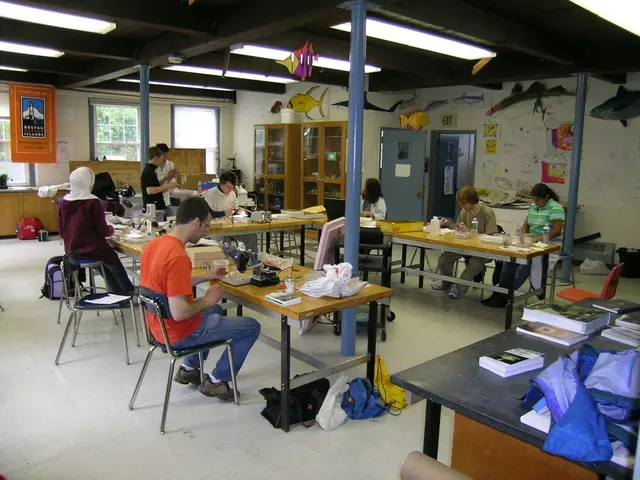Southern Europe's Subtle Stirring: Insights from Spain on the L4 Movement
In a time when the continent seems to be growing distant from the Gospel, the question of making an effective Christian presence in Europe has been a pressing concern for many. The Lausanne 4 Congress, held some years ago, left a significant impact, prompting a rethinking of strategies to bring the message of Jesus to neighbours.
One approach that has garnered attention is learning from the strategies employed by the Christian communities in the Global South. The Global South, particularly in Southern Europe, has been making a 'silent roar' that commands attention due to its strength, humility, constant work, and growth in difficulty.
Effective Christian presence in Europe, drawing on strategies from the Global South, involves several key approaches. Firstly, contextualized ministry and media outreach. Ministries from the Global South utilize culturally diverse and accessible media such as radio and web-based programs to reach multifaceted audiences. This method leverages modern digital platforms while respecting local cultures and languages, which has proven effective in Southern European contexts with diverse populations.
Secondly, charismatic and Pentecostal networks for mobilization. Charismatic Christianity, which has strong roots and expansive growth in parts of the Global South, demonstrates powerful community-building and mobilization strategies. These movements emphasize spiritual identity and resilience in the face of political and social challenges, framing participation as a spiritual duty. Their ability to sustain loyalty and influence even after setbacks offers a model for engaging Christian presence dynamically and with ideological durability.
Thirdly, engagement beyond theological appeals: holistic service and social action. Historical experience from Africa highlights the importance of combining evangelism with tangible social services—medical aid, education, and sustainable development—appealing to both spiritual and practical needs. Christian missions that focus solely on theological conversion without integrated social support often face resistance, whereas those offering holistic care foster deeper acceptance and impact.
Caution against repeating colonial approaches is another critical lesson. Awareness of the historical patterns where Christianity was seen as a guise for imperialism or resource extraction must be avoided. Strategies must emphasize respect for European cultural contexts and sovereignty, avoiding any perception of external domination or cultural imperialism.
Lastly, addressing political and social polarization is crucial. Contemporary Christian presence often intersects with nationalist or political movements, but the Global South experience, especially in charismatic communities, underscores framing Christian engagement around spiritual unity rather than divisive politics. This can help European Christian efforts maintain focus on faith-sharing and social cohesion rather than factionalism.
Lidia Martín, a clinical psychologist and author, suggests starting a quiet roar from the fire within us to see a new Europe in the following years. Overcoming individualism, relativism, immediatism, sentimentality, and other secular values embedded in our hearts is necessary to achieve this. The goal is to make the message of Jesus something that can be casually discussed among neighbours, similar to the way it was in Acts.
The message of Jesus needs to be presented in a renewed, relevant, and direct way, natural and committed, transformative and integral, wherever we are, whoever we talk to. The personal one-on-one human factor is crucial in presenting Christ to people, particularly addressing their unique situations like stress, depression, and anxiety. To call Europe a 'difficult mission field' is true, and it may require asking the Lord to deliver us from hidden sins.
Two urgent matters are identifying specific challenges of people here and now and finding points that connect with universal concerns, which the Gospel resolves in a subversive way. The article discussing these strategies can be downloaded or read individually on the Vista Journal website, an online journal offering research-based information about mission in Europe, founded in 2010, and this article first appeared in the December 2024 edition. The 'silent roar' of the Global South offers a beacon of hope for a Europe that seems comatose or almost dead to the Gospel, inviting us to join in the revitalization of the Christian presence on the continent.
- Lidia Martín, a clinical psychologist and author, advocates for a personal approach in revitalizing the Christian presence in Europe, encouraging individuals to address their neighbors' unique situations like stress, depression, and anxiety with the message of Jesus.
- To make the message of Jesus relevant and effective in today's Europe, it's essential to identify specific challenges of people in the present and find common ground with universal concerns, addressing them in a subversive manner with the solutions offered by the Gospel.
- Effective Christian presence in Europe can be achieved by learning from the strategies employed by the Christian communities in the Global South, such as contextualized ministry and media outreach, charismatic and Pentecostal networks for mobilization, holistic service, and social action, while avoiding the repetition of colonial approaches and political polarization, and focused on spiritual unity and personal growth.




